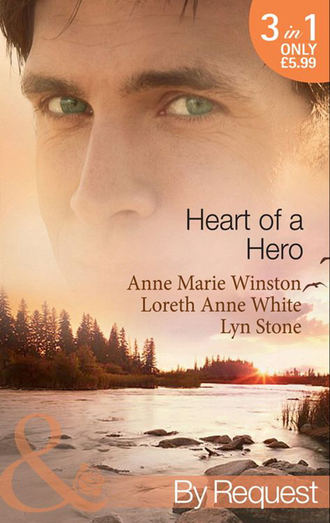
Полная версия
Heart of a Hero: The Soldier's Seduction / The Heart of a Mercenary / Straight Through the Heart


Heart of a Hero
ANNE MARIE WINSTON
LORETH ANNE WHITE
LYN STONE

www.millsandboon.co.uk
THE SOLDIER’S SEDUCTION
ANNE MARIE WINSTON
About the Author
RITA® Award finalist and bestselling author ANNE MARIE WINSTON loves babies she can give back when they cry, animals in all shapes and sizes and just about anything that blooms. When she’s not writing, she’s managing a house full of animals and teenagers, reading anything she can find and trying not to eat chocolate. She will dance at the slightest provocation and weeds her garden when she can’t see the sun for the weeds any more. You can learn more about Anne Marie’s novels by visiting her website at www.annemariewinston.com
Dedicated to the memory of those animals who
perished when they were left behind during
Hurricane Katrina and with warmest thanks
to every rescuer and animal lover who responded
and saved so many others.
One
It wasn’t what he’d expected.
Wade brought the rental car to a halt along the curb and simply absorbed the sight of the modest, cozy home nestled in the small-town neighborhood. Phoebe’s home. Phoebe’s neighborhood.
He cut the ignition and eased himself from the car, taking in the pretty autumn wreath on the front door, the carved pumpkin on the second of the brick steps leading to the porch, the fall flowers in bright shades of rust, burgundy and gold that brightened up the bare spaces in front of the small bushes along the foundation.
He’d assumed she would live in an apartment. He didn’t really know why he’d thought that, but every time he’d pictured Phoebe since he’d learned she had moved away, he’d imagined her living in an apartment or a small condo. Nothing so…permanent, as this house appeared to be.
He’d gotten quite a shock when he’d finally returned home, eagerly anticipating his first sight of her—only to learn that she’d left California months earlier. He didn’t even want to think about the bleak misery that had swept through him, the letdown that had been so overwhelming that he’d just wanted to sit down and cry.
Not that he ever would. Soldiers didn’t cry. Especially soldiers who had been decorated all to hell and back.
Living at home had been difficult. Only two short months before he’d been injured, he’d gone home on leave for his mother’s funeral. While he was recuperating, his father made valiant attempts to keep things as normal around the house as possible. But without his mother, there was a big hole nothing could disguise.
He made casual inquiries about where Phoebe had gone, but no one seemed to know. By the time he was home for a month, he was desperate enough to start digging. The secretary of her high school graduating class had no forwarding address. A light Internet search turned up nothing. He finally thought to call Berkeley, the university she’d attended, but they wouldn’t, or couldn’t, give him any information.
He was about ready to consider hiring a private investigator when he thought of calling June, the only girl other than Phoebe’s twin sister Melanie who he could really remember Phoebe hanging around with in high school. Geeky little June with her thick glasses and straight As. Someone Melanie wouldn’t have been caught dead hanging out with, but as he recalled, a genuinely sweet kid.
They really had seemed like kids to his four-years-older eyes back then. But by the time the twins had graduated from high school, those years had no longer seemed to be of much consequence.
Getting in touch with Phoebe’s old friend was a stroke of luck. June had gotten a Christmas card from Phoebe four months after she’d moved. And God bless her, she’d kept the address.
That address had been quite a shock. She’d gone from California clear across the country to a small town in rural New York state.
Ironically, it was a familiar area. Phoebe’s new home was less than an hour from West Point, where he’d spent four long years in a gray uniform chafing for graduation day, when he could finally become a real soldier.
He wouldn’t have been so impatient for those days to end if he’d known what lay ahead of him.
He climbed the small set of steps carefully. His doctors were sure he’d make a full recovery—full enough for civilian life, anyway. But the long flight from San Diego to JFK had been more taxing than he’d anticipated. He probably should have gotten a room for the night, looked up Phoebe tomorrow when he was rested.
But he hadn’t been able to make himself wait a moment longer.
He knocked on the wooden front door, eyeing the wavy glass diamond pane in the door’s upper portion. Although it was designed to obscure a good view of the home’s occupants, he might be able to see someone coming toward the door. But after a few moments and two more knocks, nobody showed. Phoebe wasn’t home.
Disappointment swamped him. He leaned his head against the door frame, completely spent. He’d counted on seeing her so badly. But…he glanced at his watch. He hadn’t even considered the time. It was barely four o’clock.
The last time he’d seen her, she was a year out of college with a degree in elementary education, and she’d been teaching first grade. If she still was a teacher, she might soon be getting home. She probably worked, he decided as relief seeped through him.
If she wasn’t married, he thought, trying to encourage himself, it stood to reason she’d need income. And June hadn’t heard anything about a husband. If she had married, she hadn’t taken his name, which didn’t really fit with the quiet, traditional girl he’d known so well. And he knew she hadn’t taken anyone’s name because he’d checked the local phone book and found her there: P. Merriman.
Fine. He’d wait. He turned and started for his car, but a porch swing piled with pillows caught his attention. He’d just sit there and wait for her.
If she’d been married, he wouldn’t be here, he assured himself. If she’d been married, he would have left her alone, wouldn’t have attempted to contact her again in this lifetime.
But he was pretty sure she wasn’t.
And despite the good reasons he had for staying away from Phoebe Merriman, despite the fact that he’d behaved like a jerk the last time they’d been together, he’d never been able to forget her. Never been able to convince himself that being with her had been a mistake. He’d thought of little else during his long months of recuperation and therapy. He’d nearly reached out to her then, but some part of him had shied away from a phone call or an e-mail.
He wanted to see her in person when he asked her if there was any chance she’d let him into her life again. Sighing, he dragged one of the pillows up and leaned his head against it. If only things hadn’t gotten so screwed up at the end.
It had been bad enough that Phoebe’s twin Melanie had died because of him. Indirectly, maybe, but it still had been his fault.
He’d compounded it in the biggest damn way possible when he’d made love to Phoebe after the funeral. And then he’d run.
Phoebe Merriman jumped when the mobile phone in her minivan began to play the jazzy tune she’d programmed into it. That phone hardly ever rang. The only reason she had it, really, was so that Bridget’s babysitter could always reach her in case of an emergency.
Alarmed, she punched the button to take the call. A quick glance at the display had the dread in her stomach lurching uncomfortably. Phoebe had good reason to fear unexpected phone calls. And just as she’d feared, it was her home number. “Hello?”
“Phoebe?” The babysitter, Angie, sounded breathless.
“Angie. What’s wrong?”
“There’s a man sitting on the front porch. In the swing.”
The news was almost anticlimactic, considering that she’d been fearing a high fever, blood or broken bones.
“Sitting? And what else?”
“Nothing else.” Phoebe realized Angie wasn’t breathless; she was whispering. “He came to the door but I didn’t answer, so he sat down on the swing and I thought I’d better call you.” Her voice quavered a little.
Phoebe remembered how young her sitter was, newly graduated from high school and still living with her parents on the next street over, taking evening classes at a local community college. Phoebe had met Angie’s mother in her Sunday-school class and had felt lucky to find Angie.
“You did exactly right,” she assured the younger woman. “If all he’s doing is sitting there, just stay inside with the doors closed. I’m only a few blocks from home.”
She pulled into her driveway a few minutes later, the cell phone’s line still open. There was a gray sedan with a rental tag parked in front of her house. Maybe it belonged to whoever was waiting on her front porch.
“Okay, Angie,” she said. “I’m home. You stay right where you are until I come inside.”
She took a deep breath. Should she call the police? Common sense told her whoever was waiting on her porch probably wasn’t a criminal. Otherwise, he wouldn’t be here in the middle of the day, unconcerned about the neighbors taking down his license plate or identifying him. She positioned her keys between her fingers with one key thrust outward, as she’d learned in the self-defense class she’d taken when she’d first started college. Then she pivoted on her heel and headed up her front walk.
She started up the porch steps, unable to see the swing because of the trellis of roses blooming across the front of the porch. She knew from experience that a person sitting there on the swing could see out much more easily than anyone could see in.
As she reached the porch, a very large man came into view. Adrenaline rushed through her as he began to rise from the swing. She angled her body to confront him.
“What are—Wade!”
As the man’s identity registered, a wave of shock slammed into her. It couldn’t be.
Wade was dead.
Her knees felt as if they might buckle and she groped for the railing behind her. The keys fell to the floor with a loud jangle. “You—you’re Wade.” An inane statement. Of course it was Wade.
He was smiling but his eyes were watchful as he took a step forward. “Yeah. Hi, Phoebe.”
“B-b-but…”
His smile faded as she took a step backward. One eyebrow rose in a quirk as familiar to her as her own smile in the mirror. That quizzical expression had been only one of the things she’d loved about Wade Donnelly. “But what?” he asked quietly.
“I thought you were dead!” She blurted out the words as her legs gave way and she sank to the top step, dropping her head onto her knees as incredulity warred with a strong desire to cry hysterically.
Footsteps rang out as Wade crossed the porch and then the boards of the top step depressed as he sat down beside her. One large hand touched her back. “My God,” she said, the words muffled. “You really are here, aren’t you?”
“I’m really here.” It was definitely Wade, his distinctly masculine tone one she would recognize anywhere. He touched her back again, just one small uncertain touch, and she had to fight the urge to throw herself into his arms.
He never really belonged to me, she reminded herself.
“I’m sorry it’s such a shock.” His voice was quiet and deep and rang with sincerity. “I was presumed to be dead for a couple of days until I could get back to my unit. But that was months ago.”
“How long have you been home?” He’d been deployed right after Melanie’s funeral. The memory brought back others she’d tried to forget, as well, and she focused on his answer, trying to ignore the past.
“About five weeks. I’ve been trying to find you.” He hesitated for a moment. “June gave me your address and she knew I survived. I assumed she—or someone back home—had told you.”
“No.” She shook her head without lifting it. She’d stopped reading the news from home the day she’d read his obituary. And though she’d sent June a Christmas card this year, they hadn’t exchanged more than signatures since she’d moved.
Silence fell. She sensed that he didn’t know what to say any more than she did—
Bridget! Shocked that she could have forgotten her own child for a moment—particularly this moment—Phoebe leaped to her feet, ignoring Wade’s startled exclamation. “Just—ah, just let me put my things inside,” she said. “Then we can talk.”
Her hands trembled as she turned away from the man she’d loved throughout her adolescent years and into young womanhood. The keys were slippery in her sweaty grasp and she dropped them again. Before she could react, Wade came to her side and stretched down for the keys.
“Here.”
“Thank you.” She took the keys carefully, without touching his hand, fumbled the correct one into the lock and opened her front door.
Reality hit her in the face again. Wade Donnelly was alive and waiting to talk to her. And she had to tell him she’d borne his child.
Angie rushed forward as Phoebe came through the door and closed it firmly behind herself. Before the sitter could speak, Phoebe put her finger to her lips to indicate silence. She walked through the front rooms toward the back of the little house and dropped her things onto the kitchen table. “Listen,” she said to Angie in a quiet tone, “there’s nothing to worry about. He’s an old friend I haven’t seen in a long time. Can you stay a little longer in case Bridget wakes up?”
Angie nodded, her eyes wide. “Sure.”
“We’re going to talk outside. “I don’t—I’m not inviting him in and I don’t particularly want him to know about Bridget, so please don’t come out.”
Angie nodded, an uncharacteristically knowing smile crossing her face. “No problem. I wouldn’t want to cause trouble for you.”
Phoebe paused in the act of walking back through the living room. “Cause trouble for me?”
“With people back where you came from.” Angie gestured vaguely. “I mean, I know everybody has babies without getting married these days, but if you don’t want anyone back home to know, that’s your business.”
Phoebe felt her eyebrows rising practically to her hairline. She opened her mouth, then closed it abruptly before hysterical laughter could bubble out. Dear innocent Angie thought she was hiding Bridget because she was ashamed of having an illegitimate child. If only it were that simple!
She swallowed as she slipped through the front door again, closing it securely behind her. Wade was standing now, leaning against one of the porch posts, dwarfing the small space. Lord, she’d forgotten how big he really was.
She drank in his appearance, trying to reconcile the grief she’d carried for the past six months with the reality of seeing him alive and apparently well. His dark, wavy hair was conservatively short compared to the out-of-control locks he’d sported in high school, but quite a bit longer than the last time she’d seen him, when he’d had a high and tight military cut that had stripped every bit of curl away. If he weighed an ounce more than he had then, it wasn’t noticeable; his shoulders were still wide and heavily muscled, his hips narrow and his belly flat, his legs still as powerful looking as they’d been when he’d been a running back for the high school football team. That had been almost a dozen years ago, and she’d been a silly middle-school teen at the time, already pathetically infatuated with her older, totally hot neighbor.
Then she realized he was watching her stare at him, his gray eyes as clear and piercing as always beneath the black slashes of his eyebrows. She felt her cheeks heat and she crossed her arms over her chest.
Taking a deep breath, she voiced the question burning in her mind. “Why were you reported dead if they weren’t sure?” Her voice shook with the remembered agony of learning that Wade was gone forever. “I read about your funeral…” The sentence died unfinished as she realized she’d read about the plans for his funeral. In his obituary.
Wade blinked, but before his gaze slid away from hers, she caught a glimpse of a haunting pain. “Battlefield mistake,” he said. “They found my dog tags but not my body. By the time the mistake was corrected, word had already gone out that I’d been KIA.”
She put a hand to her mouth, fighting the tears that desperately wanted to escape. All these months she’d thought he was dead….
“I was injured,” he said. “In the chaos that followed the explosion, a friendly Afghani hid me. It took the guy three days to make contact with American troops, and it wasn’t until then that the mistake was caught. The fellow who died whom they’d assumed was me had already been shipped to Germany for autopsy. They’d have caught the mistake eventually, but I sure gave a lot of people a shock. And just for the record,” he added, “Mom and Dad didn’t actually have a funeral. It was planned, then canceled. I guess you didn’t attend or you’d have found out.”
She opened her mouth, then closed it again and simply shook her head. She still wanted to cry. Badly. I was having your baby at the time was so not the thing to say.
She risked a glance at him and was almost undone by the pain in his eyes.
Unable to bear being the cause of that pain, she said, “I couldn’t come back for the funeral.” She turned away and settled on the porch swing. “It took every penny I had to move here.” Well, that wasn’t a lie. She’d been lucky to find this place, luckier still that, although she had few assets, her credit history was good and with the teachers’ credit union behind her, she’d been able to qualify for a mortgage. It hadn’t hurt that the cost of living in California was so much higher than it was here. She’d never have been able to afford even this modest little home if she’d stayed on the West Coast.
“Why did you move?” he asked suddenly. “All the way across the country? I know you don’t have any family to keep you in California, but that’s where you grew up, where your roots are. Don’t you miss it?”
She swallowed. “Of course I miss it.” Terribly. I miss the cobblestones on the beaches and the freezing cold water, the balmy days and cooler nights that rarely vary. I miss driving down to Point Loma, or over to Cardiff, and watching whale migrations in the fall. I even miss the insanity of driving on the freeway and the fire danger. Most of all, I miss you. “But my life is here now.”
“Why?”
She raised her eyebrows. “Why what?”
“What makes rural New York state so special that you have to live here?”
She shrugged. “I’m a teacher. I’ll have tenure in two more years and I don’t want to start over again somewhere else. The pay is good here and the cost of living is more manageable than in Southern California.”
He nodded. “I see.” He joined her on the swing, sitting close but not touching. He placed an arm along the back of the swing and turned slightly toward her. “It’s good to see you.” His voice was warm, his eyes even more so.
She could barely breathe. He was looking at her the way she’d dreamed of for years. Years when he’d been too old for her to do more than dream of, years when he’d been her sister’s boyfriend, more recently when she’d thought he was dead and she was raising his child alone.
“Wade…” She reached out a hand and placed her palm gently against his cheek. “I’m so glad you’re alive. It’s good to see you, too, but—”
“Have dinner with me tonight.”
“I can’t.” Fear infused her voice with a touch of panic. She started to withdraw her hand but he covered it with his, turning his face into her palm, and she felt the warmth of his lips whispering against the tender skin.
“Tomorrow night, then.”
“I—”
“Phoeber, I’m not taking no for an answer.” The silly childhood nickname gave the moment an even deeper intimacy. “I’m not leaving here until you say yes.”
She stepped back a full pace as he finally released her hand. Dinner was a bad idea, given the way her heart still pounded at the mere sight of him.
She’d grown up in the months since she’d become a parent. She no longer believed in the kind of love she read about in romance novels. At least, not mutual love that was returned. And she’d stopped allowing herself to believe that what had happened between Wade and her that day at the cabin had been anything but his reaction to the shock of her sister’s death.
Now Wade was here, back from the dead, untying every neatly packed-away detail in her memories. Confusing her, rousing feelings she hadn’t let herself feel in more than a year, the warmth of possibilities in his eyes scaring her to death.
She wanted to go back an hour, to come home as always to an empty porch and no tough conversations.
But she had to tell him about Bridget.
It was the last thing she wanted to do, but she had to. A few weeks before she thought he had died, she’d realized she couldn’t keep Wade’s child from him. Telling him in an e-mail or on the phone was unthinkable, however. She’d been planning to visit him, wherever he was stationed, as soon as she could travel again, and a promise was a promise. Even if it was only to herself.
But not yet. She could hardly just invite him in, not with the bassinet and high chair, the board books and infant toys, unmistakable signs of a baby in residence. And anyway, Angie had class tonight so she wouldn’t be able to stay much longer. Phoebe needed to get rid of him, plan the best way to tell him of his fatherhood.
“All right,” she finally said. “Dinner tomorrow night because I have something to tell you.” The words nearly choked her.
Wade raised an eyebrow in question, but when she didn’t elaborate he made no comment. All he said was “Shall I pick you up at seven?”
“I’ll meet you,” she said quickly. “Are you staying in town?”
As it turned out, he was staying at a hotel on the other side of town. Attached to it was a restaurant that she knew had somewhat secluded booths along the walls, so she suggested they meet there. Then she stood on the porch and watched as he walked to the gray sedan.
He smiled at her over the roof of the car before he climbed in. “See you tomorrow night.”
She nodded, her heart stuttering at the warmth in his eyes, even though she reminded herself it wasn’t anything more than friendship she saw there. “See you then.”
But as she watched him drive away, she wondered if it wouldn’t just be easier to vanish, the way people in the witness protection program did. Anything had to be easier than telling Wade he was the father of a child. Her child.
Memories bombarded her….
She was twelve. Her twin sister Melanie perched beside her on a pink bike exactly like Phoebe’s purple one, and they both watched the neighborhood boys playing baseball on the local park’s grassy ball field.
“I’m gonna marry Wade when I grow up,” Melanie announced.
Phoebe frowned. “He’s going to be grown up before we are. What if he marries somebody else?” The thought of Wade Donnelly marrying anybody made her feel all twisted up inside. Wade lived across the street from them, and he was four years older than they were. Phoebe had had a crush on him since before she could remember.
“He won’t marry anybody else,” Melanie said confidently. “I’m going to make him love me.”
And she had.
When they were seniors in high school, Melanie had initiated her move. Phoebe went to the prom with Tim DeGrange, a friend from her Latin class. Melanie had asked Wade, even though he had just graduated from West Point that year, and to Phoebe’s shock he had said yes. Prom night had been long and miserable. Melanie had clung to Wade all evening. He’d looked so handsome in his brand-new dress uniform that he’d made Phoebe’s heart hurt, and she’d been suddenly so shy she could barely force herself to talk to him.








